Extremely rare astronomical event: Asteroid Leona to eclipse red supergiant Betelgeuse

An extremely rare celestial event will unfold at the beginning of next week as the main belt asteroid Leona transits in front of Betelgeuse, the famed red supergiant in the Orion constellation. This rare astronomical occurrence, observable from regions stretching from South Florida to Italy and Greece, will offer a unique spectacle where the luminous Betelgeuse may temporarily dim or even vanish from the night sky.
In an extraordinary celestial event, the main belt asteroid Leona is set to occult Betelgeuse (or Alpha Orionis), one of the brightest stars in the night sky. This rare occurrence is scheduled for December 11th in the USA and December 12th in Europe, offering millions of observers a chance to witness a stellar eclipse. Betelgeuse, a red supergiant in the constellation Orion, will dim or even vanish as Leona passes directly in front of it, creating a spectacle visible from South Florida to Italy and Greece.
J. L. Ortiz of the Instituto de Astrofísica de Andalucía, leading a study on this event, notes the opportunity to analyze Betelgeuse’s diameter and brightness with unprecedented angular resolution. Unlike typical stars, Betelgeuse’s immense size – 760 times that of the sun – makes it appear as a 40 milliarcseconds wide disk in the sky. The asteroid’s transit could provide valuable insights into the star’s turbulent surface, marked by giant convection cells, which are crucial to understanding its potential supernova explosion.
Leona itself presents an interesting element to this occultation. Previous observations in September 2023 revealed its oblong shape, measuring 80 x 55 km (50 x 34 miles), and its rotation, factors that might lead to unexpected outcomes during the eclipse. These characteristics could widen the occultation path and create unique partial eclipse effects, even at the center.
In south Florida, including Miami and Fort Lauderdale, Betelgeuse is expected to wink out for approximately 10 seconds just before 20:25 EST on December 11. In Europe, the event will occur between 01:10 UTC and 01:16 UTC on December 12.
Expanding on the visibility of this event, the eclipse’s path stretches from Tajikistan and Armenia, across Turkey, Greece, Italy, Spain, to Miami, the Florida Keys, and parts of Mexico. This astronomical phenomenon, involving Betelgeuse and the asteroid Leona, offers a unique opportunity for both professional astronomers and enthusiasts to gather valuable data on these celestial bodies.
Betelgeuse, an estimated 700 light-years away and thousands of times brighter than our sun is a young star at just 10 million years old. Despite its youth, it is expected to have a short lifespan due to its massive size and rapid consumption of material. The star gained significant attention in 2019 when it dimmed dramatically, a change attributed to a large ejection of surface material forming a dust cloud.
We still don’t know whether the occultation will result in a total eclipse or a ‘ring of fire’ effect. Gianluca Masa of the Virtual Telescope Project anticipates the eclipse to last no more than 15 seconds and will be providing a live webcast from Italy for global viewers.
Betelgeuse’s future is a topic of scientific speculation, with expectations of it going supernova in a spectacular explosion within the next 100 000 years.
References:
1 EXTREMELY RARE OCCULTATION OF BETELGEUSE – SpaceWeather – December 8, 2023
2 Asteroid Will Pass In Front Of Bright Star Betelgeuse To Produce A Rare Eclipse Visible To Millions – AP – December 8, 2023
Featured image: This is the first direct image of a star other than the Sun, made with the Hubble Space Telescope. Called Alpha Orionis, or Betelgeuse, it is a red supergiant star marking the shoulder of the winter constellation Orion the Hunter. The Hubble image reveals a huge ultraviolet atmosphere with a mysterious hot spot on the stellar behemoth’s surface. The enormous bright spot, which is many hundreds times the diameter of Sun, is at least 2 000 Kelvin degrees hotter than the surface of the star. Credit: Andrea Dupree (Harvard-Smithsonian CfA), Ronald Gilliland (STScI), NASA and ESA.

Commenting rules and guidelines
We value the thoughts and opinions of our readers and welcome healthy discussions on our website. In order to maintain a respectful and positive community, we ask that all commenters follow these rules.